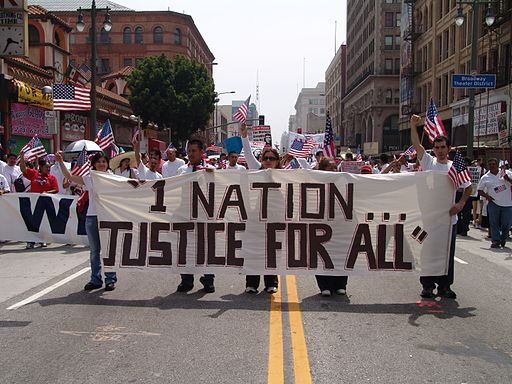
April 2, 2017; Washington Post
Maina Kiai and David Kaye, independent human rights investigators at the United Nations are warning that, under President Trump, our foundational right to democratic protest is under attack. They point to numerous bills introduced by GOP legislators in 19 states that, taken together, present an “alarming and undemocratic trend.”
What do these measures look like? Here are some examples from the past few months:
- In a number of states, Republican lawmakers have proposed penalties for demonstrators who block traffic—up to and including one bill in North Dakota that would prevent motorists who run over and kill protestors from being held liable should the crash be deemed accidental.
- A bill in Indiana would permit the police to use “any means necessary” to remove protestors from the roadway.
- The Arizona State Senate voted in February to expand racketeering laws to allow police to arrest anyone involved in a protest and seize their assets, treating demonstrators like organized criminals, though the House Speaker has said he “won’t hear the bill,” rendering it essentially dead.
- Colorado lawmakers have proposed increased penalties for environmental protestors.
- One bill in Virginia would have increased penalties for anyone who “unlawfully” assembles after “having been lawfully warned to disperse.” (That one was killed in January.)
- In North Carolina, one lawmaker wants to criminalize heckling political officials.
Kiai and Kaye objected to the language in some of the proposed bills that characterized protests as “unlawful” or “violent.”
There can be no such thing in law as a violent protest. There are violent protesters, who should be dealt with individually and appropriately by law enforcement. One person’s decision to resort to violence does not strip other protesters of their right to freedom of peaceful assembly. This right is not a collective right; it is held by each of us individually.
Sign up for our free newsletters
Subscribe to NPQ's newsletters to have our top stories delivered directly to your inbox.
By signing up, you agree to our privacy policy and terms of use, and to receive messages from NPQ and our partners.
Peaceful assembly is a fundamental right, not a privilege, and the government has no business imposing a general requirement that people get permission before exercising that right.
Meanwhile, federal Judge David J. Hale in Kentucky has refused to throw out a lawsuit against Donald Trump accusing him of inciting violence against protesters at a March 2016 campaign rally in Louisville.
At the rally, Trump repeatedly said “get ’em out of here” before, according to the protesters, they were shoved and punched by his supporters. Trump’s attorneys sought to have the case dismissed on free speech grounds, arguing that he didn’t intend for his supporters to use force. But Hale noted that speech inciting violence is not protected by the First Amendment and ruled that there is plenty of evidence that the protesters’ injuries were a “direct and proximate result” of Trump’s words.
“It is plausible that Trump’s direction to ‘get ’em out of here’ advocated the use of force,” Hale wrote. “It was an order, an instruction, a command.”
—Ruth McCambridge













